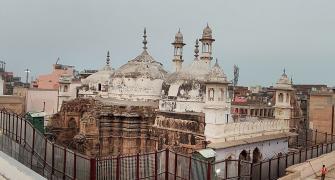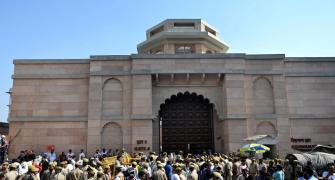"What is frivolous to you is faith to the other side", the Supreme Court on Friday told the Anjuman Intezamia Masjid committee on its contention that the Gyanvapi Shivling is a fountain and refused to stay the Allahabad high court order allowing a scientific survey by the ASI at the mosque complex to determine if the 17th-century structure was built upon a pre-existing temple.

A bench comprising Chief Justice D Y Chandrachud and Justices J B Pardiwala and Manoj Misra, however, asked the Archaeological Survey of India (ASI) to carry out the survey through "non-invasive methodology".
Taking note of the submissions of Solicitor General Tushar Mehta, appearing for the ASI and the Uttar Pradesh government, that neither any excavation nor any destruction will be caused to the structure during the survey, the bench disposed of a petition filed by Anjuman Intezamia Masjid Committee (which manages the Gyanvapi Mosque at Varanasi) challenging the Allahabad high court's Thursday order.
During the hearing, senior advocate Huzefa Ahmadi, appearing for the mosque management committee, contended that the exercise by the ASI is "digging into history", violating the Places of Worship Act and impinging upon fraternity and secularism.
"The ASI survey intends to go into the history as to what happened 500 years ago. It would reopen wounds of the past," Ahmadi said, voicing displeasure over the survey ordered by the Allahabad high court, and added that the survey violates the Places of Worship (special provisions) Act, 1991 which prohibited change of character of religious places as they existed in 1947.
"You can't oppose every interlocutory order on the same ground and your objections will be decided during the course of the hearing," said the bench.
The bench also did not agree with the contention of the mosque panel that the plea of the Hindu side was frivolous.
"If someone now comes and files a frivolous plea saying that there is a monument below this structure... will you order an ASI survey," Ahmadi said.
"What is frivolous to you is faith to the other side,” the bench asserted, adding that for the Hindu side, "it is Shivling, and you say it is a fountain."
The bench said it is clarified on the affidavit on behalf of the ASI that as a matter of fact, the entire survey will be completed without any excavation at the site and without causing any destruction to the structure.
At this stage, prima facie, the order of the trial judge passed directing a scientific investigation by the ASI cannot be said to be without jurisdiction, the bench noted.
"Having regard to the nature and ambit of a court-appointed commissioner, we are unable to differ with the view of the high court, particularly in the jurisdiction under Article 136 (special power to grant special leave to appeal against any judgment)," the bench said.
Allaying apprehensions of the Muslim side that the survey may harm the structure, the bench said, "The job or function of the ASI is to preserve and protect property, monuments of historic importance, and hence there is no basis for the apprehension that any damage will be caused to the structure."
"We also order and direct that the entire process shall be concluded by a non-invasive methodology that may be adopted by the ASI. We reiterate the direction that there should be no excavation at the site in accordance with the statement which was made before the High Court by the ASI and which has been reiterated in the submissions made by the solicitor general before this court on behalf of the ASI," it said.
The report of the ASI will be submitted to the trial court and the decision on that will be taken by the district judge, it said.
The top court said the evidentiary value of the scientific survey of the ASI was open to be tested in the lawsuit and is open to objections, including cross-examination.
"The court is also empowered that if it is dissatisfied with the proceedings of the commissioner, it can direct such further inquiry to be made as it shall deem fit. The evidentiary value of any report of the commissioner is, therefore, a matter to be tested in the suit and is open to objections, including cross-examinations,” it said.
Hence, the report of the commissioner does not by and of itself amount to any substantive finding on the matter of dispute and is subject to the process of the court during the trial, it said.
Moreover, the court, if it is dissatisfied with the proceedings of the commissioner, is empowered to direct further inquiry to ascertain the evidentiary value of any report, it said.
Consequently, the ASI report, by itself, does not amount to a determination of the matters in dispute.
The high court, in our view, was correct in introducing a certain specific direction to circumscribe the nature of the order passed by the district judge that there will not be any excavation at the site, it said.
The apex court was hearing pleas by the mosque committee against the Allahabad high court order permitting an ASI survey at the Gyanvapi mosque.
The high court had on Thursday dismissed a petition filed by the Gyanvapi committee challenging a district court order directing the ASI to survey to determine if the mosque was built upon a pre-existing temple. It said the district court order was "just and proper", and no interference from it is warranted.
The same day, the mosque panel moved the top court against the high court order, seeking an urgent hearing.
One of the parties from the Hindu side has also filed a caveat in the apex court saying no orders be passed without hearing them in the matter.
The Varanasi district court had on July 21 directed the ASI to conduct a "detailed scientific survey" -- including excavations, wherever necessary -- to determine if the Gyanvapi mosque located next to the Kashi Vishwanath temple is built upon a temple.
The mosque's wazukhana, where a structure claimed by Hindu litigants to be a Shivling exists, will not be part of the survey following an earlier Supreme Court order protecting that spot in the complex.
Hindu activists claim a temple existed earlier at the site and was demolished in the 17th century on the orders of Mughal emperor Aurangzeb.








